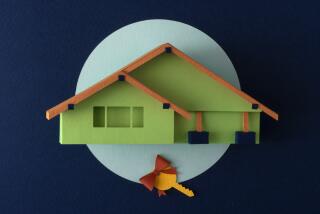Home Improvement : Screening Determines If Home Has Radon in It
- Share via
QUESTION: I am thinking about buying a home and my friend told me about radon in homes and that it causes cancer. What is radon, does radon cause cancer, has any been found in the Los Angeles area and can it be eliminated?
ANSWER: According to the Los Angeles Department of Heath Services, “Radon is a naturally occurring, colorless, odorless gas that can seep out of the ground and accumulate in homes.” According to the U.S. Environmental Protection Agency, “The only known effect of radon is lung cancer. It is the second leading cause of lung cancer behind cigarette smoking.”
A study involving 2,000 single-family dwellings conducted by the Los Angeles County Department of Health Services in 1990, projected that as many as 35,000 to 70,000 homes (2%-4%) in the county may have elevated levels of radon.
The threat of radon can be eliminated. There are specially trained radon mitigation contractors who can seal gas leaks in foundations, install special fans, etc., in order to reduce radon levels in the indoor atmosphere. You can get a list of qualified contractors from the American Lung Assn. of Los Angeles County by calling (213) 935-LUNG.
Don’t let anyone tell you that there is no radon in the area unless they have screened the home in question. Screening for radon may delay or complicate the real estate transaction, but buyers have the right to know if they so desire.
Buying Remos That Don’t Have Permits
Q: I have been looking for a home to buy and some of the homes I’ve seen have additions and modifications without permits. What exactly does this mean to me?
A: It means that you could be buying a house that has unsafe, unsanitary or structurally unsound conditions. You may have to bring it into compliance or change it back to its original condition. You may also have a difficult time selling the home later, or worse yet, your insurance company will not cover losses due to improvements made without permits. At a minimum, you will be required to disclose the conditions to prospective purchasers.
A friend recently tried to refinance his duplex with a remodeled kitchen and bathroom. The bank appraiser detected the changes and the lender demanded a code inspection. Because permits were not obtained for the work, it did not pass the code inspection, hence, the refinance application was denied.
Say, for instance, an addition was made to a property and the addition wall was too close to the side yard or rear yard setback and a neighbor complained. The city will issue an “Order to Abate,” meaning, the wall has to come down. When buying a home with bonus rooms, heating and air conditioning systems, new roofs (especially heavy tile), remodeled kitchens, etc., request the sellers to provide the relevant permits and make sure a “Certificate of Occupancy” was issued or the work was properly signed off when completed. Not only can you be burdened with corrections, you will also have an increase in the cost for the property tax assessment.
No Sneaking Out the Back Door
Q: I just moved into a home and noticed that a key is required to exit the back door. What are the advantages and disadvantage to this kind of lock?
A: This is a double-cylinder deadbolt. The advantage is that you can take the key out when you leave during the day or for a vacation, hence, creating more security for your property. More importantly, the disadvantage is that if you take the key out and misplace it, you could be trapped inside in the event of a fire or emergency.
More to Read
Inside the business of entertainment
The Wide Shot brings you news, analysis and insights on everything from streaming wars to production — and what it all means for the future.
You may occasionally receive promotional content from the Los Angeles Times.










